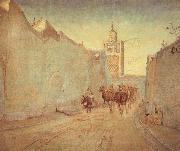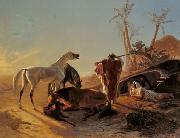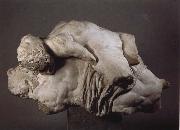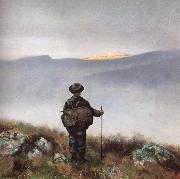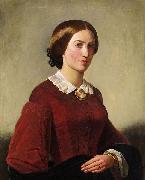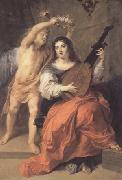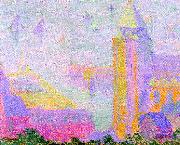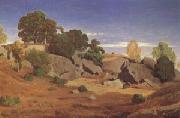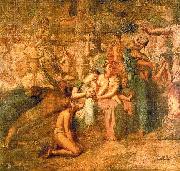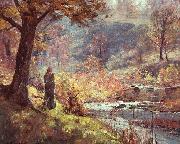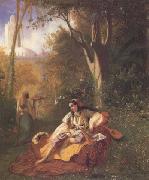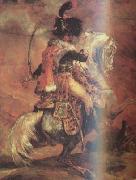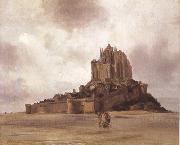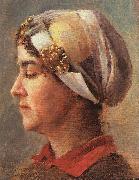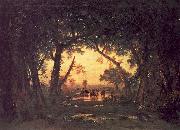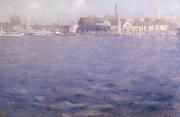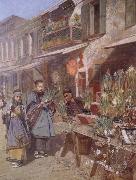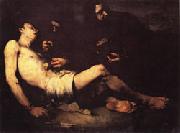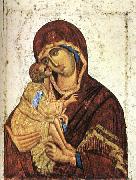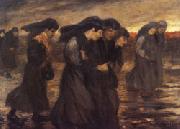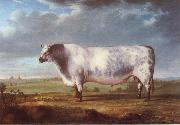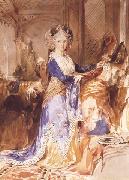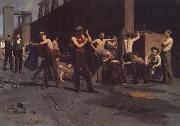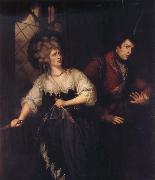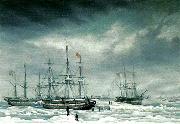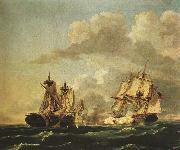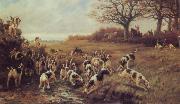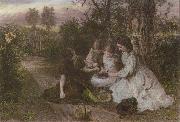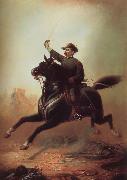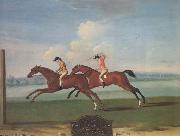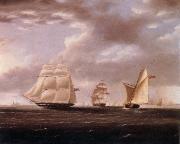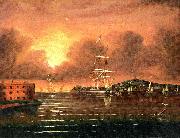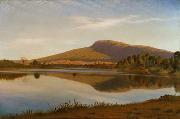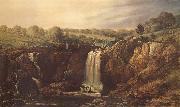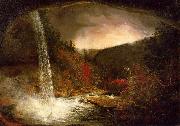|
|
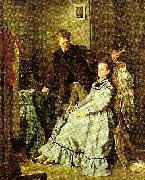 |
theodor alt
|
|
(Januar 1846 in Döhlau bei Hof (Oberfranken,', ', ', ', ', ', ', '); 8. Oktober 1937 in Ansbach) war ein deutscher Maler.
Alt war der Sohn des Döhlauer Pastors Heinrich Alt und dessen Ehefrau Justina Ziegler. Nach erstem Unterricht durch seinen Vater besuchte Alt die Lateinschule in Regensburg, wo sein Vater von 1856 bis 1870 der evangelischen Gemeinde vorstand.
1861 wechselte er an die Kunstgewerbeschule N??rnberg, wo er als Schuler von Hans Ringlein bis 1863 blieb. Im Spatsommer desselben Jahres wechselte Alt mit Empfehlung seiner Lehrer an die Kunstakademie in M??nchen. Dort wurde er zuerst Sch??ler von Hermann Ansch??tz und in den Jahren 1866 bis 1873 bei Arthur von Ramberg. |
|
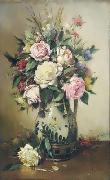 |
Theodor Aman
|
|
Theodor Aman (Romanian pronunciation: [teˈodor aˈman]; 20 March 1831, Câmpulung-Muscel-19 August 1891, Bucharest) was a Romanian painter of Armenian descent. His style is often considered to be a predecessor of Impressionism.
He is buried in Bellu cemetery.
|
|
|
|
|
|
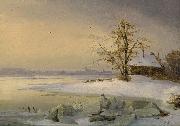 |
Theodor Hosemann
|
|
painted Blick uber die Havel auf das winterliche Brandenburg in 1838 |
|
|
|
|
|
|
|
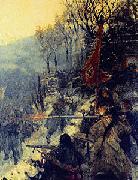 |
Theodor Rocholl
|
|
(1854-1933), German military painter and war artist.
Rocholl was born in Sachsenberg (Waldeck) on June 11, 1854, the son of Rudolf Rocholl, the Lutheran theologian and philosopher. He was a student in Munich in 1877, then at the Dresden Academy. After a year, he moved to Munich where he studied historical painting under Karl von Piloty. He ocmpleted his art studies at the Desseldorf Academy where he developed his interest in military art under the influence of Wilhelm Camphausen; his contemporaries in this field were Carl Röchling and Richard Knötel. The artist observed the Franco-Prussian War and the subsequent German army manoeuvres between 1883 and 1888; in 1890, he traveled to Russia to view the German Garde-Korps on manoeuvre. Later in the decade, he was attached to the Turkish Army and covered the conflict in Thessalia in 1897 between the Turks and the Greeks; his sketches of the fighting were published the following year. He covered the Boxer Rebellion in 1900 as the official artist of the German expeditionary force. A decade later, he covered the fighting between Turkey and Albania.
Many of his paintings depict German military scenes, especially the battles of the Franco-Prussian War. One of his most famous pictures depicted King William at the Battle of Sedan, meeting his triumphant soldiers after the victory. Rocholl also painted a large mural for the Evangelischen Padagogiums in Bad Godesberg.
In his 60th year, he became a war artist covering the campaign on the Western Front. His War Letters printed in 1916 in which he described the fear and destruction. An autobiography of his life as a painter appeared in 1921. He died in a streetcar accident Desseldorf in his 80th year on September 14, 1933.
|
|
|
|
|
|
|
|
|
|
|
|
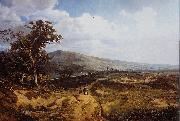 |
Theodore Fourmois
|
|
(14 October 1814 in Presles - October 1871 in Ixelles) was a Belgian landscape painter and printmaker.
Theodore Fourmois learned drawing in the lithographic's workshop of Antoine Dewasme-Pletinckx in Brussels. He first exposed his works in this city in 1836. He began painting landscapes of Ardennes and Campine, several studies and panoramic views while traveling in Dauphine and Switzerland. |
|
|
|
|
|
|
|
|
|
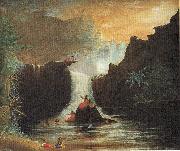 |
Theodore Heuck
|
|
(1830 - 1877) was an architect, a merchant, and a painter. He designed The Queen's Medical Center (dedicated to Queen Emma), the Royal Mausoleum of Hawaii in 1865, and ʻIolani Barracks in 1871.
He was born in Hamburg, Germany and grew up as an only child. Traveling from Australia, Heuck arrived in Hawaii January 20, 1850 and advertised as the first professional architect. Finding no business, he became a partner with Herman Von Halt in a retail store, "General Commission Merchants". He became a citizen of the Kingdom of Hawaii and married Mahiki on March 22, 1852 |
|
|
|
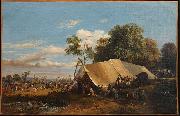 |
Theodore Ravanat
|
|
(born in Grenoble on 4 May 1812, died in Proveysieux on 21 September 1883) was a French landscape painter. Ravanat's work is mostly composed of Dauphine landscapes. His paintings are generally among private collections of Grenoble, but some of these paintings can be seen at the Museum of Grenoble or the Musee dauphinois. |
|
|
|
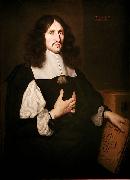 |
Theodore Roos
|
|
Theodore "Teddy" Roosevelt, October 27, 1858 - January 6, 1919, was the 26th President of the United States (1901-1909). He is noted for his exuberant personality, range of interests and achievements, and his leadership of the Progressive Movement, as well as his "cowboy" persona and robust masculinity. He was a leader of the Republican Party and founder of the short-lived Progressive ("Bull Moose") Party of 1912. Before becoming President, he held offices at the city, state, and federal levels. Roosevelt's achievements as a naturalist, explorer, hunter, author, and soldier are as much a part of his fame as any office he held as a politician. |
|
|
|
|
|
|
|
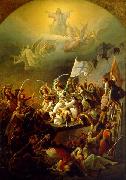 |
Theodoros Vryzakis
|
|
Thebes 19 October 1814 - Munich 6 December 1878) was a major Greek painter of the 19th century.
Vryzakis's father died in the Greek War of Independence. He is the first Greek painter who studied in Munich and the main representative of the type of historical painting that was popular in Greece in the 18th century.
He is considered the first painter of modern Greece, a recorder of the Greek War of Independence, which he viewed in a romantic and nostalgic way. His paintings' characters are pompous, theatrical and detached figures. His interest in the traditional costumes and the decoration and the absence of any individual facial expression is according to art critics the result of the eye of a "foreign" artist, who looks for the conventional element in another land. The monumental size of his pictures, the ceremonial and theatrical compositions, and the meticulous style of academic idealistic romanticism make his style unique for among Greek Artists. Today, many of his works are exhibited at the National Gallery of Athens and the Benaki Museum in Athens.
|
|
|
|
|
|
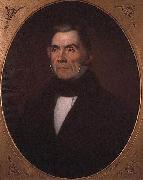 |
Theophile Hamel
|
|
(8 November 1817 - 23 December 1870) was a Canadian artist who painted mainly portraits and religious images in 19th-century Quebec.
Hamel was born in 1817 in Sainte-Foy (that was a suburb of Quebec City), the son of a successful farmer. Hamel's paternal ancestry can be traced to French immigrant Jean Hamel, who arrived in New France from Avremesnil (Normandy) in 1656. In 1834 Theophile was already taking art lessons from Antoine Plamondon. His early portraits show a mixture of European romanticism and Canadian simplicity. His style gradually changed to match the taste of his clients for simple, honest, even prim portraits |
|
|
|
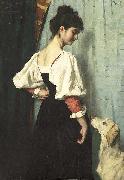 |
Therese Schwartze
|
|
(December 20, 1852, Amsterdam - December 23, 1918, Amsterdam) was a Dutch portrait painter.
Therese was the daughter of Johan Georg Schwartze (1814 - 1874), from whom she received her first training, before studying for a year under Gabriel Max and Franz von Lenbach in Munich. In 1879 she went to Paris to continue her studies under Jean-Jacques Henner. Her portraits are remarkable for excellent character drawing, breadth and vigour of handling and rich quality of pigment.
She was one of the few women painters who had been honoured by an invitation to contribute their portraits to the hall of painters at the Uffizi Gallery in Florence. Some of her best pictures, notably a portrait of Piet J Joubert, and Three Inmates of the Orphanage at Amsterdam, are at the Rijksmuseum, and one entitled The Orphan at the Boyman Museum in Rotterdam.
|
|
|
|
|
|
|
|
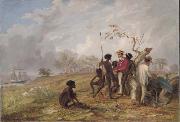 |
Thomas Baines
|
|
(27 November 1820 ?C 8 May 1875) was an English artist and explorer of British colonial southern Africa and Australia. Born in King's Lynn, Norfolk, Baines was apprenticed to a coach painter at an early age. When he was 22 he left England for South Africa aboard the "Olivia" (captained by a family friend William Roome) and worked for a while in Cape Town as a scenic and portrait artist, and as official war artist during the so-called Eighth Frontier War for the British Army.
In 1855 Baines joined Augustus Gregory??s 1855?C1857 Royal Geographical Society sponsored expedition across northern Australia as official artist and storekeeper. The expedition??s purpose was to explore the Victoria River district in the north-west and to evaluate the entire northern area of Australia in terms of its suitability for colonial settlement. |
|
|
|
|
|
|
|
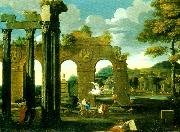 |
Thomas Blanchet
|
|
Thomas Blanchet (1614, possibly in Paris - 21 June 1689, Lyon) was a French painter, draughtsman, architect, sculptor and printmaker.
During his training in Paris Blanchet met Jacques Sarazin, and on his advice moved from studying sculpture to painting. During this time he familiarised himself with the Baroque and the School of Fontainebleau's Mannerism, new imports into Paris at this time. Among his probably co-students was Simon Vouet. He stayed in Rome from c.1645 to 1653 and worked with artists in Nicolas Poussin's circle, as well as visiting the studios of Andrea Sacchi and Pietro da Cortona. He was highly praised by Gianlorenzo Bernini, who he also visited. Blanchet produced paintings for Niccolo Guido di Bagno (1584 -1663), made engravings of ancient tombs and views or prospettive and a mausoleum for Rene de Voyer d'Argenson, French ambassador to Venice in San Giobbe, Venice (1654). |
|
|
|
|
|
|
|
|
|
|
|
|
|
|
|
|
|
|
|









